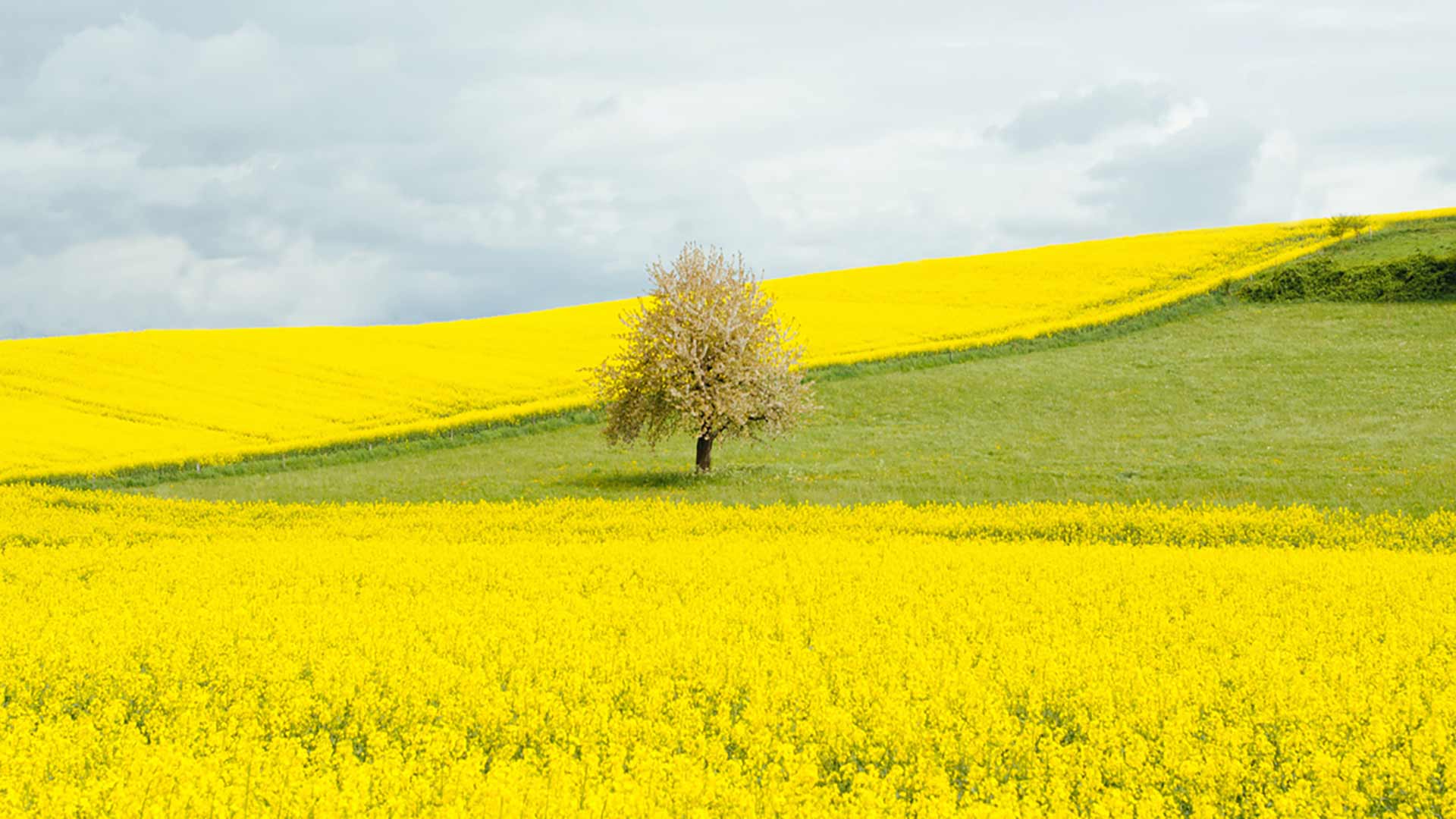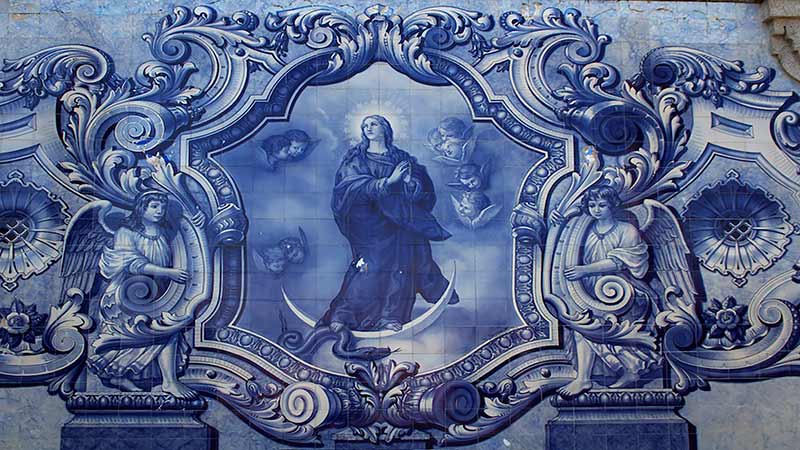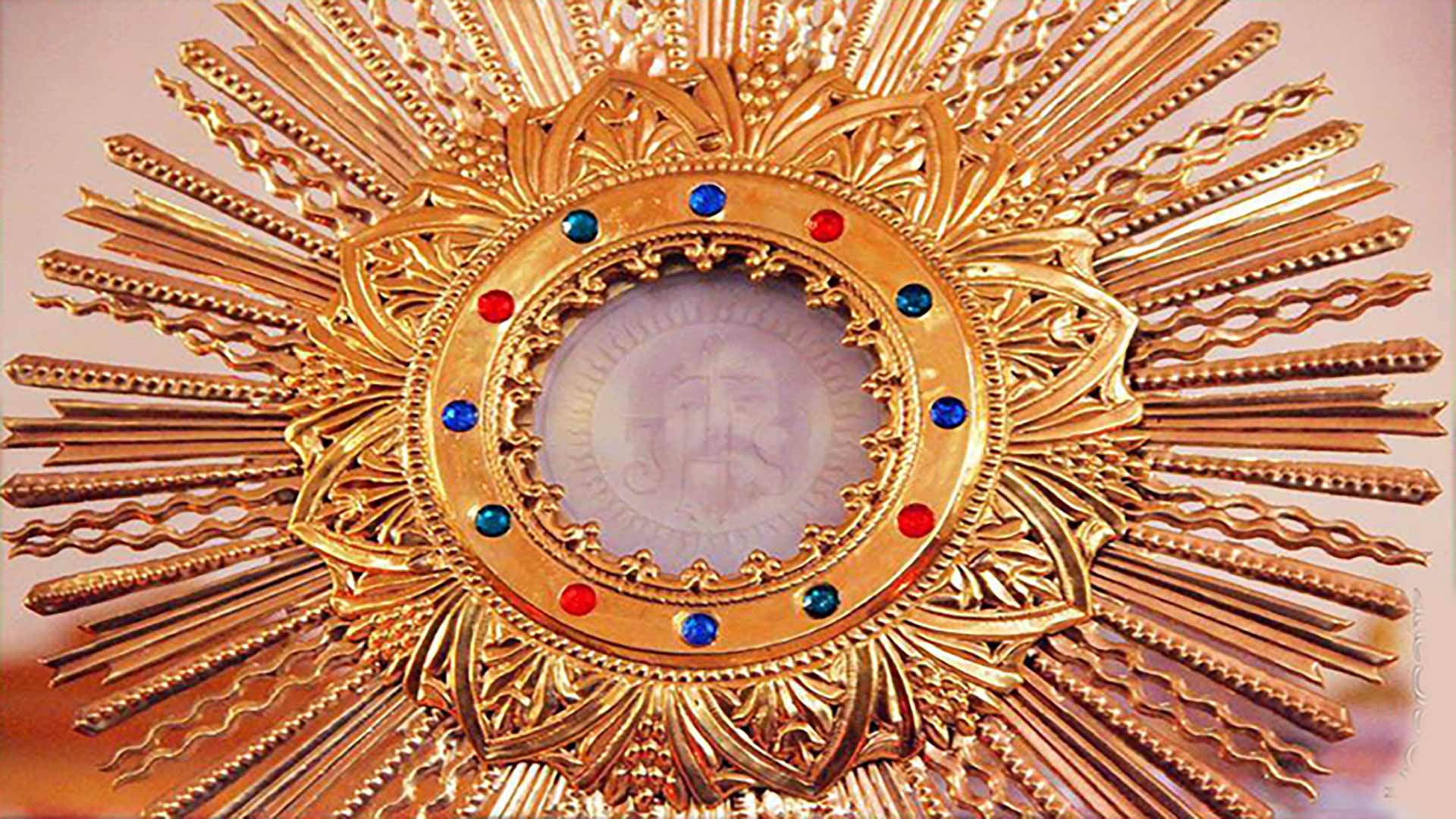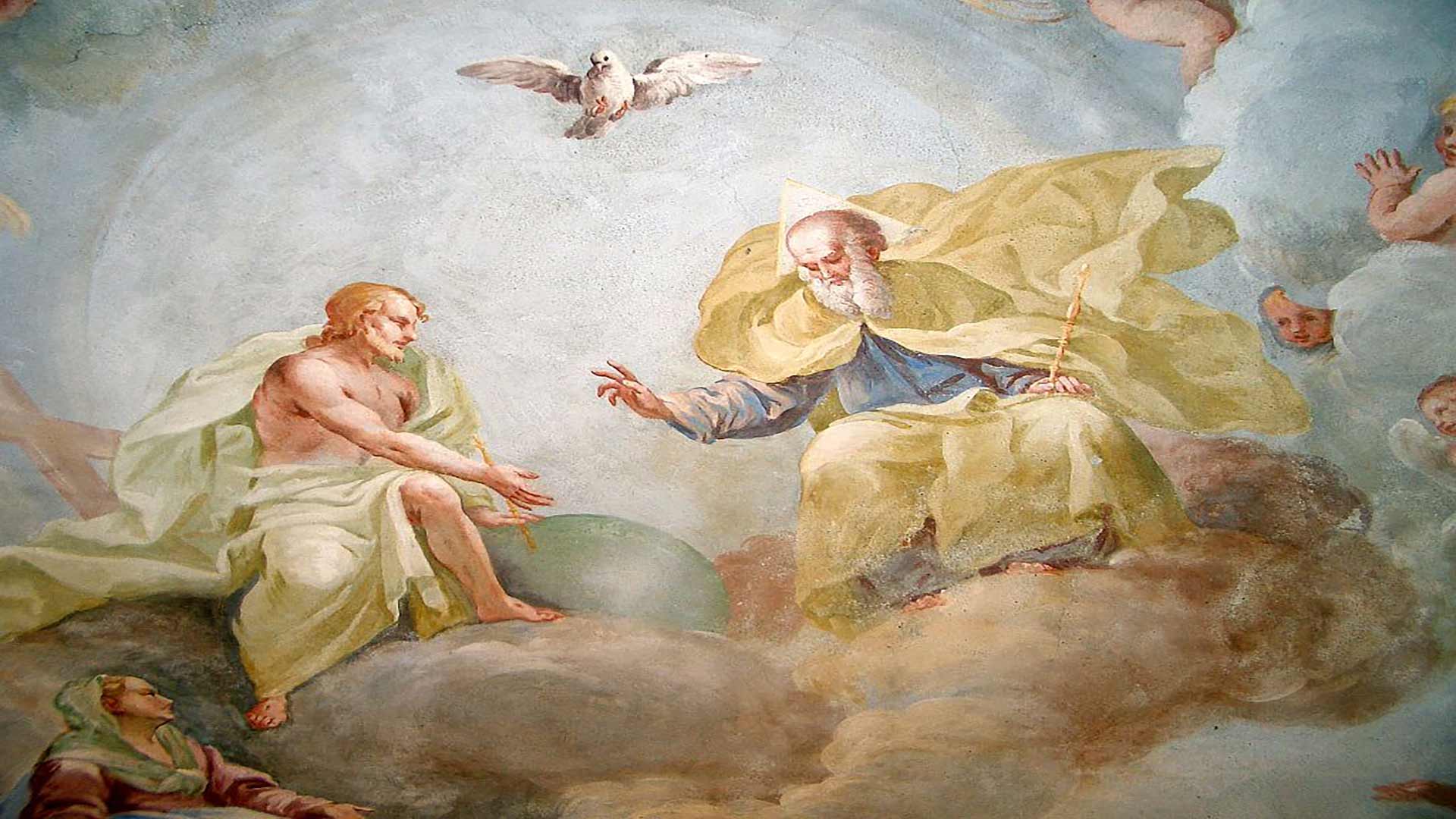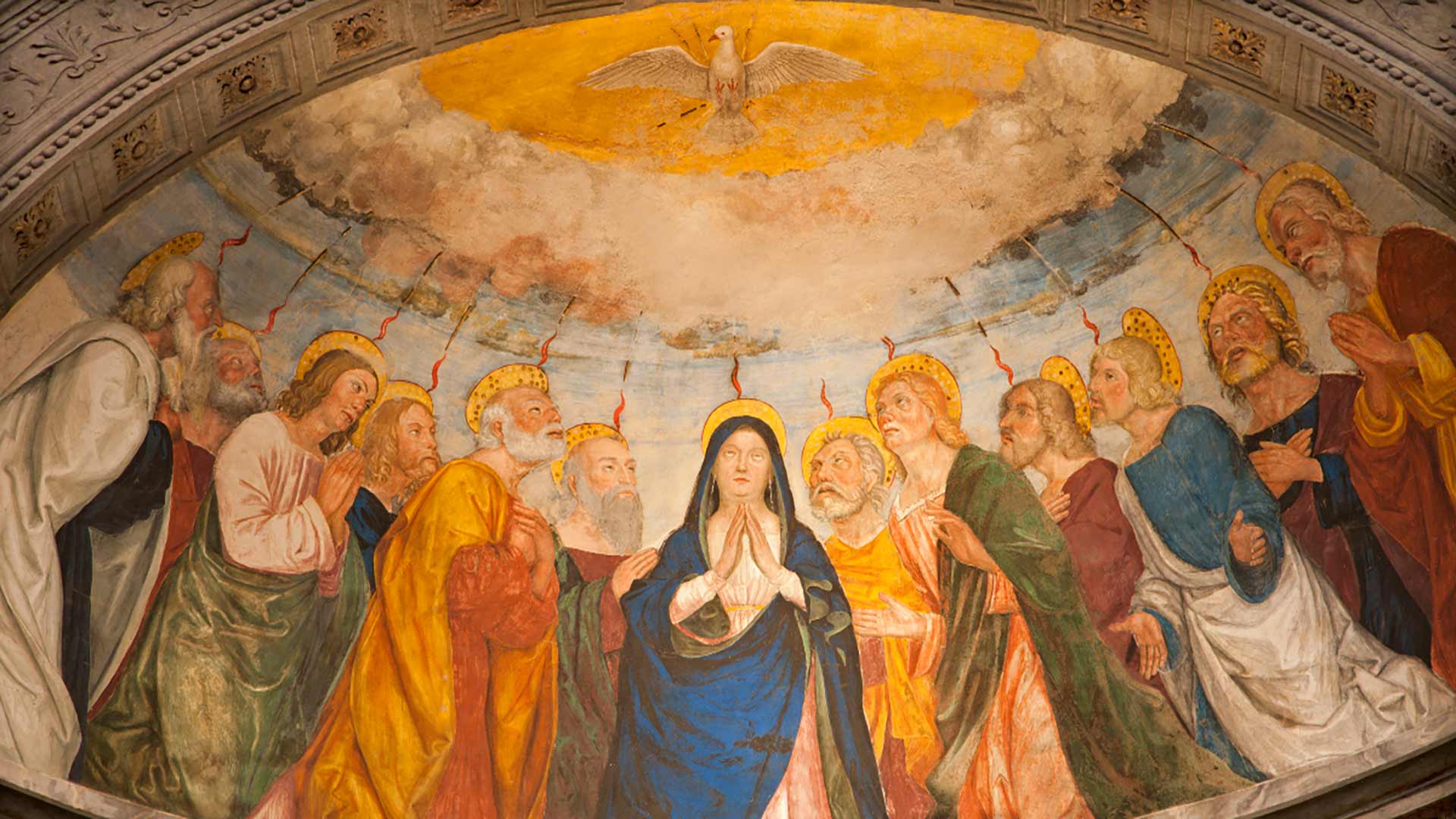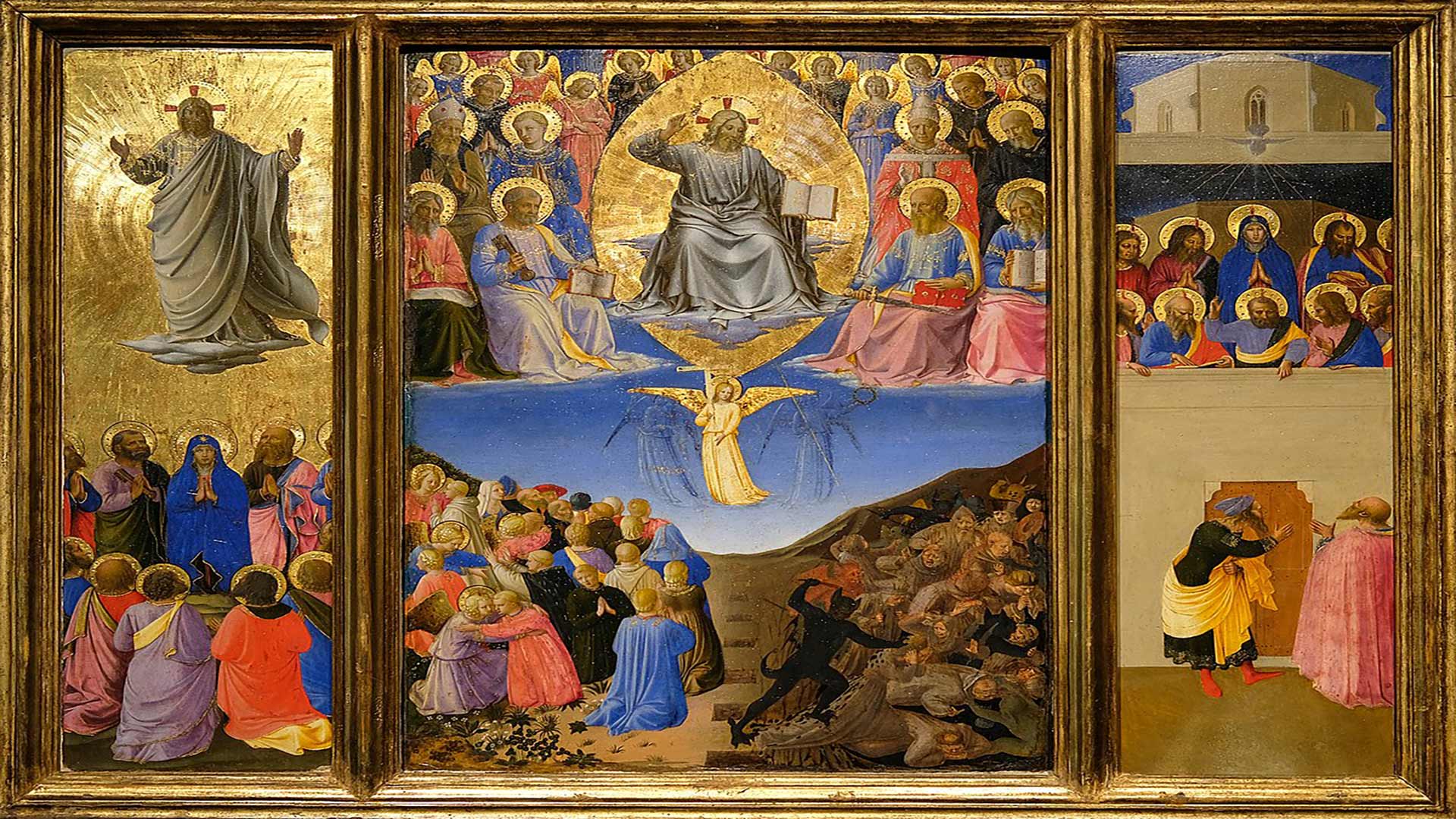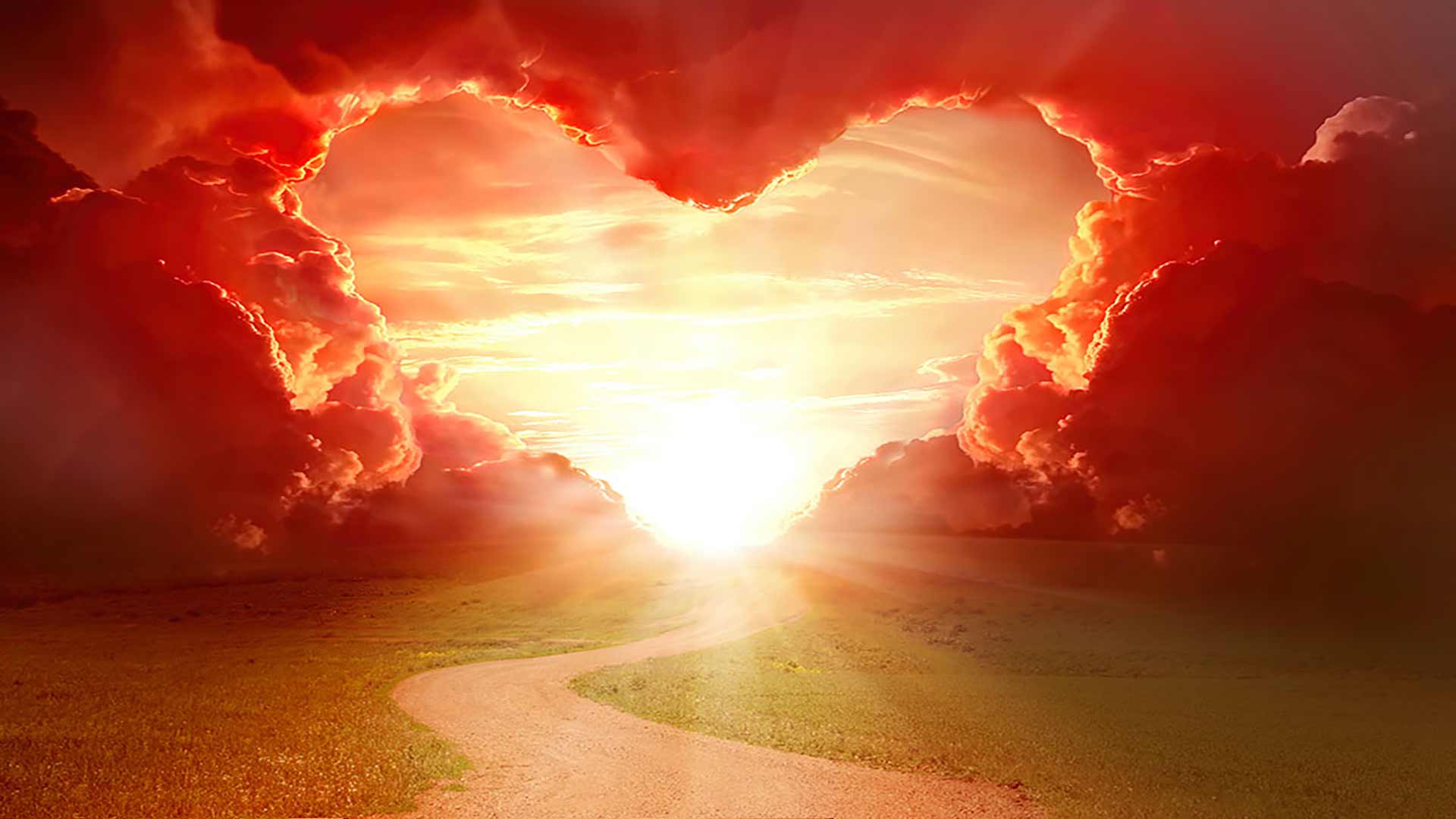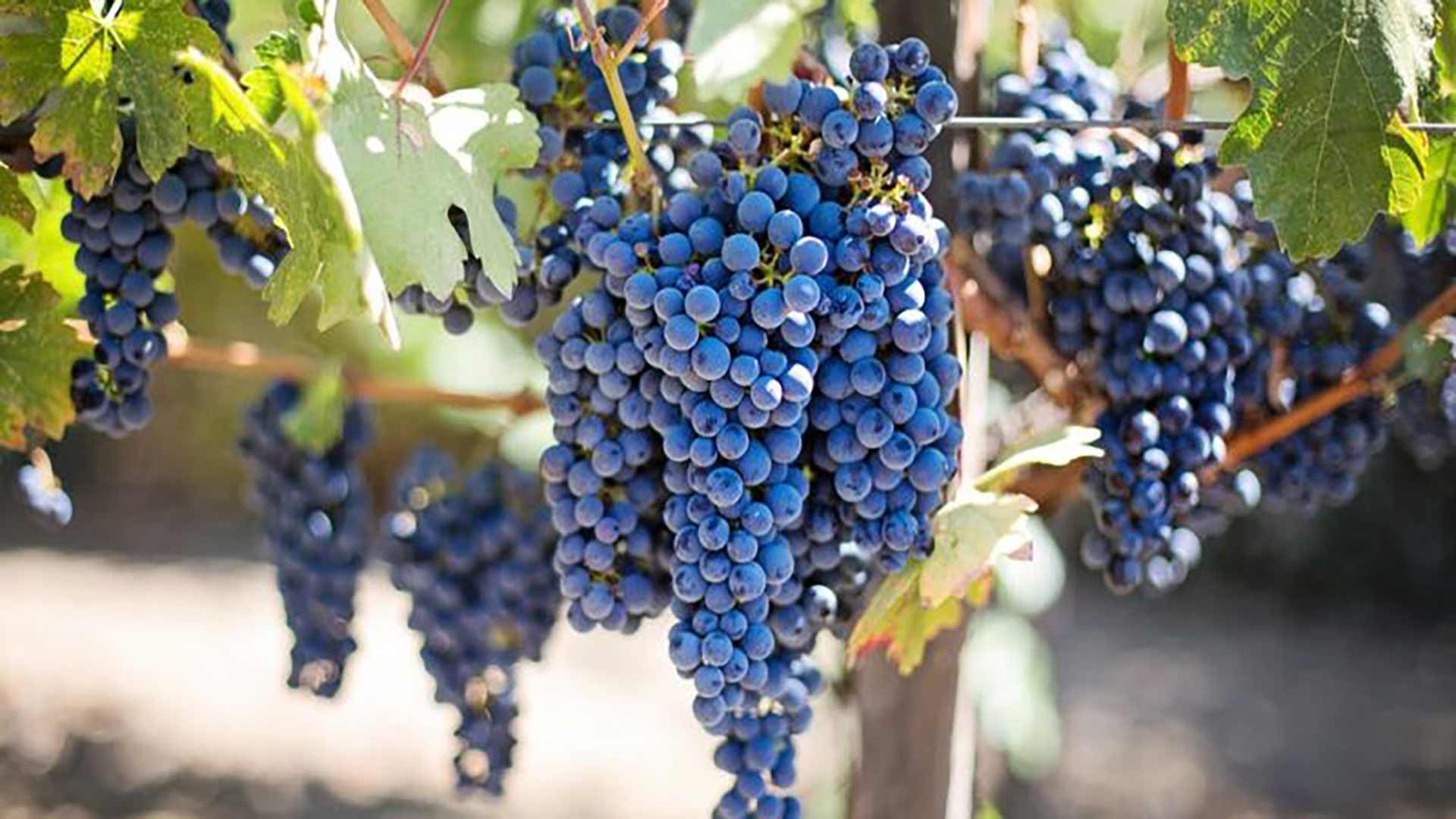Faith amid the Storms
At any given point of time, we find ourselves face-to-face with storms big or small: interpersonal, social, political, economic, psychological, spiritual. That is the stuff of life. We may eventually learn to weather the storms, but there are times when we fail to bounce back. Then, if humble enough, we may turn to God and ride it out. Thus, a storm acts as a reminder that God truly exists…
The backstory of God’s faithful servant Job, in the First Reading (Job 38: 1, 8-11), is not that he disbelieves; on the contrary, he is an upright man, firmly committed to God. Why, then, does he lose everything – family, wealth and even health? His suffering hurts the core of his being. He wonders why he is at the receiving end. Might he have secretly or even if unknowingly displeased God? At any rate, he is angry and questions the Almighty.
God’s response to Job is the crux of today’s text. Evidently, Job was acting as a judge in his own case. God demands to know if he can explain every phenomenon of the universe. If not, why question His designs? The virtue of hope lets life’s events cause wonder and love, and not dwindle into distress and despair. Before long, Job understands that there is more than meets the eye. He sees that back from the day of Original Sin suffering has been an inseparable part of life; and that God is beyond human understanding.
To sustain life, we need to make a leap of faith. It was something that even the disciples had failed to do at first, so we know it is never easy. In the Gospel text (Mk 4: 35-41) they are baffled, not to say outraged, by Jesus’ indifference to their boat rocking in the rough sea. For His part, the Lord wants his disciples to ask for help – to pray! – so He might promptly assist them. His command ‘Be still!’ was not magical but divine. Did they realise they were before the Creator Himself? Filled with awe, they said to one another, ‘Who then is this, that even wind and sea obey Him?’
A question that Jesus put to His disciples, He puts to you and me today. When we face trouble and our faith vacillates, He asks: ‘Why are you afraid? Have you no faith?’ These very questions, coming as they do from Jesus' mouth, are so reassuring; they suggest that Jesus is ever ready to help us. ‘Who then is this?’ Yes, we must get to know Him more closely, seek a personal encounter and establish a deep rapport with Him, confide in Him… Not that problems or sufferings will vanish, but we will learn to trust in Him through thick and thin. And what’s more, it will bring us peace of heart.
As the lyrics of that hymn make it clear, ‘No one can give to me that peace that my Risen Lord, my Risen King can give…’ And when God is with us, who can be against us? We have to make an effort to rise above ourselves. Then, no storm will shake us, no battle, rattle us. Hence, St Paul in the Second Reading (Cor 5: 14-17) exhorts us to be ‘in Christ’, for ‘if anyone is in Christ, he is a new creation.’ Elsewhere, the Apostle famously said, ‘It is not I who live, but Christ who lives in me’ (Gal 2: 20).
All in all, we must abstain from a business-like relationship with God – that is, seek Him only when we are in trouble. We cannot be like the sailor who, when caught in a tempest, said: ‘Help me, O Lord, and save me just this time; be sure I will never knock at your door again.’
Never knock at the Lord's door ever again? Ours is a valley of tears where troubles are a staple of life. Indeed, we must cry to the Lord in good times and in bad. Needless to say, He is with us and rescues us from our distress (Cf. Ps 28-29). The weaker we feel, the stronger is His support – when we live through Him, with Him, in Him. Our Lord has said: ‘I will be with you till the end of times’ (Mt 28: 20); He leads us to a safe haven. His must be the final victory. Instaurare Omnia in Christo: we have to restore all things in Christ.
Banner: https://shorturl.at/ZxYQw
Under His Wing
Who does not know that it is foolish to put our complete trust in anybody but the Lord our God? The Serpent is a foil to our salvation whereas the Lord alone is our rock, our fortress, our Saviour. Accordingly, the three Readings of today invite us to proceed humbly and patiently, with faith, hope and trust in the Lord.
In the First Reading (Ezek. 17: 22-24), the Prophet gives hope to Israel whose temple in Jerusalem the Babylonian king Nebuchadnezzar had destroyed. God promises to break off a branch from the lofty top of the majestic cedar and plant it upon a high mountain. That tree prefigured the Church under whose shade the peoples of the world would find refuge. The fact is the Almighty can ‘bring low the high tree, and make high the low tree, dry up the green tree, and make the dry tree flourish.’ Thus, only those who hope and trust in Him will be saved.
Israel was destroyed by successive enemies. God promised to save it if it returned to Him. Whereas it would never again be it an independent kingdom, God invited its people to cherish the Kingdom of Heaven which is eternal. In today’s Gospel text (Mk 4: 26-34), Jesus illustrates that truth by way of two parables. In the first, He makes it clear that as long as we scatter seed upon the ground – live our life – we are free to sleep and rise night and day. The seed will sprout and grow – life will take its course – regardless. When we acknowledge God’s supremacy, we have no cause for worry.
But that truth is unpalatable to the so-called positivists; they lack basic faith in God and the will to believe in Him. And after all, what does it take? Jesus assures us that it is enough that one’s faith be as small as a mustard seed. When that smallest of seeds is sown, it grows into the greatest of shrubs – even though we know not how. So, why be daunted by small beginnings? We must only make sure we enjoy God’s favour. Then, there could be growth and success in the wink of an eye – a truth that confounds the mighty and faithless!
Silver and gold we may have none but spiritually enriched are we, thanks to the seed of the Kingdom that Jesus has sown in our hearts. For our part, do we water it and let it grow, or do we neglect and let it be overwhelmed by worldly weeds? We are blessed that our ancestors received the Faith and passed it on to us. But then, how far do we value and nurture it through prayer, Scripture reading, practice of the sacraments and good works? How ardent are we in desiring that His kingdom come, as we pray in the ‘Our Father’?
Despite being a divine institution, the Church has had small beginnings and braved great adversities to form a Christian Civilisation. Yet, centuries later we have let it all go. Some at the helm have the temerity to overturn Tradition and reinterpret Her doctrine, thus hacking at its very foundation. Obviously, Satan is working overtime to plant weeds in the Lord’s Vineyard. But we should not be disheartened. We must continue with all our might and with all the strength that God gives us. The Church will remain until the end of the world, for Jesus said to him who would be the first Pope: ‘You are Peter, and on this rock, I will build my Church, and the gates of hell shall not prevail against it.’ (Mt 16: 18)
In fact, no persecutor has succeeded against the Church; many have even come to a sad end. If we only remember that Voltaire died in despair! And many occurrences today do set us thinking and many contemporary saints have shown us the way. Finally, He who is the Way, the Truth and the Life will Himself return at harvest time – the end of times! How many of us will be ready? So, it is high time we straightened our paths.
That is why St Paul in the Second Reading (2 Cor 5: 6-10) exhorts the church in the bustling city of Corinth to walk by faith and make it their aim to please the Lord. The Apostle of the Gentiles notes that, with just a partial and indirect knowledge of God, living ‘by faith, not by sight’, our life is an exile, ‘away from the Lord.’ Hence, it would be preferable to die: ‘be away from the body and at home with the Lord.’ That is to say, have no attachment to earthly life. After all, we will all soon come to the judgement seat of Christ, and receive good or evil, in accordance with our acts. Is it not better, then, to right away place ourselves under the Lord’s wing?
Banner: https://rb.gy/3jefss
Serpent vs. Salvation
After the Ascension, a string of solemnities followed: Pentecost, the Most Holy Trinity and the Body and Blood of Christ. Last Friday and Saturday we celebrated the Solemnities of the Sacred Heart of Jesus and Immaculate Heart of Mary. And today is the Tenth Sunday in Ordinary Time[1] when we will live in the light of the Paschal Mystery and the Mystery of the Church, until the last Sunday in Ordinary Time,[2] which hails Christ, the Universal King.
Remarkably close on the heels of that Marian Solemnity, we hear in the First Reading (Gen 3: 9-15) about how Adam and Eve lost their friendship with God. Original Sin reduced them to mere mortals and generated more sin. Soon, God reprimanded Satan who was in the guise of a serpent: ‘I will put enmity between you and the woman, and between your seed and her seed; he shall bruise your head, and you shall bruise his heel.’
The serpent has ever since been loathsome to humankind; only the pronouns ‘he’ and ‘his’ became a bone of contention. Whereas masculine pronouns appear in the Hebrew text which St Jerome followed for his edition of the Vulgate, many early Fathers and some later editions of the Vulgate, used ‘she’ and ‘her’ instead. Since the first half of the verse clearly applied to Mary, the second half followed suit... So, was it through a mere copyist’s error that Mary was given the ‘credit’?
Pope John Paul II crushes our petty thinking by stating that Mary’s enmity towards Satan was absolute. He perceptively adds: ‘This [Hebrew] text then does not attribute the victory over Satan to Mary but to her Son. Nevertheless, since the biblical concept establishes a profound solidarity between the parent and the offspring, the depiction of the Immaculata crushing the serpent, not by her own power but through the grace of her Son, is consistent with the original meaning of the passage.’[3]
Thanks to Mary’s wholehearted participation in the economy of salvation, the Incarnation became a reality; then, she became the New Eve and He, the New Adam. In today’s Gospel text (Mk 3: 20-35), the New Adam announced the end of Satan. This came in response to some friends who had thought He was beside Himself while the scribes had had the audacity to accuse Jesus of colluding with Beelzebub, the prince of demons. Jesus retorted: ‘How can Satan cast out Satan? … And if Satan has risen up against himself and is divided, he cannot stand, but is coming to an end.’ The backstory is that His enemies could not stomach the miraculous cures Jesus had wrought; He had also given the Twelve power to expel demons (Cf. Mk 3: 13-19).

Even in the midst of such turbulence, Jesus utters words of infinite love: ‘Truly, I say to you, all sins will be forgiven the sons of men, and whatever blasphemies they utter; but whoever blasphemes against the Holy Spirit never has forgiveness, but is guilty of an eternal sin – for they had said, He has an unclean spirit.’ The sin against the Holy Spirit here is the hatred that prompts a person to attribute to the devil an act that is manifestly the work of the Holy Spirit. By his culpable obstinacy and blindness, the person declines divine forgiveness and salvation.
Such is the magnitude of that sin and the inescapability of punishment; personal relations and favours can do nothing. And does Jesus seem offensive to His Mother? No. In fact, He calls us to be like her, who uniquely said, ‘I am the handmaid of the Lord. Be it done unto me according to Thy Word.’ And Jesus twice refers to her in that verse: as one who gave Him birth and does God’s will!
A true relationship with God can be secured only by believing and trusting in Him. Thankfully, ‘whoever does the will of God is my brother, my sister, and mother’ is a sign of hope to us all. In the Second Reading (2 Cor 4: 13; 15: 1), St Paul says that ‘we too believe, and so we speak, knowing that He who raised the Lord Jesus will raise us… So, we do not lose heart.’ Jesus is that life coach par excellence, who gives us hope as no other can. Our years may waste away, but not so our soul, which is ‘renewed every day.’ Similarly, our earthly existence is a ‘slight momentary affliction’, insignificant when compared with the ‘eternal weight of glory beyond all comparison’ awaits us.
In conclusion, a supernatural approach to life is of the essence. We ought to see that, when ‘the earthly tent we live in is destroyed, we have a building from God, a house not made with hands, eternal in the heavens.’ Here, there are never contradictions between the Father and the Son, there is no enmity between the Mother and the Son. The only one who is on the other side is the Serpent, set to rob us of our Salvation: He must be crushed!
Banner: https://www.flickr.com/photos/clausfeijo/33755702862
[1] 7 January 2024 was the First Sunday in Ordinary Time (coinciding with the Epiphany of Our Lord) and 11 February 2024, the Sixth Sunday in Ordinary Time. The series of Sundays in Ordinary Time was suspended from 18 February 2024, which was the first Sunday of Lent, up to 19 May 2024, which was the Sunday of Pentecost. The series of Sundays in Ordinary resumed on 19 May 2024, the Seventh Sunday in Ordinary Time, on which Pentecost was celebrated. The Eighth Sunday in Ordinary Time, 26 May 2024, was dedicated to the Solemnity of the Most Holy Trinity and the Ninth, 2 June 2024, to the Body and Blood of Christ.
[2] 34th Sunday in Ordinary Time, 24 November 2024.
[3] https://www.ewtn.com/catholicism/library/marys-enmity-towards-satan-was-absolute-8038
Eucharist and Life
The importance of today’s Solemnity cannot be overstated: it represents the homage that is due to the Holy Eucharist, the ‘source and summit of Christian life’ (CCC 1324-1327). The Sacrament was instituted on Holy Thursday, but given the sombreness of that liturgical time, it does not get the attention that it deserves. No doubt, it is the highlight of every single Holy Sacrifice of the Mass; yet, Dies Sanctissimi Corporis et Sanguinis Domini Iesu Christi is observed as its liturgical anniversary.
What to us today is ‘Holy Thursday’ was, in Jesus’ time, the first day of the week-long Feast of Unleavened Bread. That was the Passover, when the Jews ate unraised bread, in remembrance of what their ancestors had eaten as they fled Egypt; and they sacrificed a lamb, the animal whose blood they had once sprinkled on their doorposts (Exod. 12: 13-28) – to let the plague ‘pass over’ their households. This Passover or salvation is what the Jews gratefully celebrate ever since.
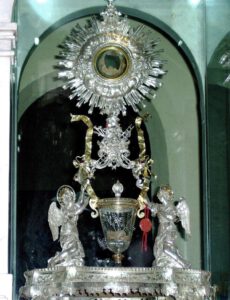
Jesus observed the Passover and made it infinitely relevant to us. He longed to celebrate his last one with the Apostles. The Gospel (Mk 14: 12-16, 22-26) tells us that He took bread, blessed and broke it, and gave it to them; then, He took a cup of wine (for there were four)[1], over which He gave thanks and of which the disciples then drank. The Meal, however, was not as light as it appears: there was lamb as well, which they ate with unleavened bread and washed down with wine. Yet Jesus chooses bread and wine over the lamb and its blood to represent His Body and Blood.
Many Jews found the idea of the Body and Blood, even if in the species of bread and wine, objectionable. The two species were however prefigured in the Old Testament: through Abram's interaction with Melchizedek (Gen 14: 21) and the miraculous supply of manna in the wilderness (Deut. 8: 2-3, 14-16, in Cycle A), among other foreshadowing. In today’s First Reading (Exod. 24: 3-8), through Moses, God establishes a covenant with His people now free; the same was sanctioned by the blood of a victim offered in sacrifice, as all solemn promises were.
Jesus is the New Moses who makes a New Covenant by offering His own Body and Blood. The Second Reading (Heb. 9: 11-15) reiterates the point that the High Priest took not the blood of goats and calves but His own, thus securing an eternal redemption. He is the Lamb of God ‘who through the eternal Spirit offered Himself without blemish to God.’ The Mediator of the New Covenant made everything new; He has cancelled the transgressions of those who believe in Him and promised them eternal inheritance.
The significance of the Holy Eucharist was ever present before the eyes of the Christians since the earliest times. Doctrinal teaching only cemented the idea in their consciousness. ‘Transubstantiation’ was defined; Eucharistic miracles were witnessed (107 approved ones till date)[2], and Corpus Christi declared a universal feast. Priests and lay people down the ages have loved the Eucharistic Lord. In 1856, the French priest, now saint, Eymard, finding special solace in the love of God manifested in the Eucharist, founded the Congregation of the Blessed Sacrament.
Closer to our times, a word about the Blessed Carlo Acutis, soon to be canonised: He possessed a deep love and devotion to Christ in the Eucharist. As the internet was gaining popularity in the early 2000s, he helped form websites for parishes, the Vatican, and made a website with information on Eucharistic miracles. He begged his parents to take vacations to 17 different countries and journaled and took copious notes on everything he witnessed. Over a span of two-and-a-half years, he documented 187 Eucharistic miracles. In the midst of his travels, he and his family prayed before hosts that have turned into blood.[3] Visit the international exhibition designed and created by him.[4]
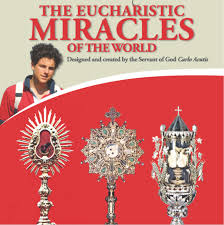
Like the Mystery of the Most Holy Trinity that is beyond human comprehension, the Holy Eucharist too is an ineffable Sacrament. However, in his apostolic exhortation Sacramentum Caritatis (Sacrament of Charity), Pope Benedict XVI, with reference to the presentation of the gifts, speaks of the relationship between the Eucharist and daily life: ‘In the bread and wine that we bring to the altar, all creation is taken up by Christ the Redeemer, to be transformed and presented to the Father. In this way we also bring to the altar all the pain and suffering of the world, in the certainty that everything has value in God’s eyes’ (No. 47).
Truly, just as God liberated the Israelites of old from the physical bondage of Egypt, Jesus liberates us from the bondage of sin and death.
-o-o-o-o-
[1] The Passover meal was divided fourfold: first, a dish of herbs was served and a festival blessing spoken over the first cup of wine; second, a recital of the Passover narrative and the Little Hallel (Psalm 113) and drinking of the second cup; the third was the main course (lamb and unleavened bread), after which was drunk the third cup of wine, called the “cup of blessing”; finally, there was the singing of the Great Hallel (Psalms 114-118) and the drinking of the fourth cup of wine. It is said that Jesus drank the third one only. Then he said, ‘I shall not drink again of the fruit of the vine until that day when I drink it anew in the kingdom of God.’ Accordingly, he refused the sour wine while on the Cross.
[2] Four Eucharistic miracles of the twenty-first century have been approved: Chirattakonam, India (2001); Tixtla, Mexico (2006), Sokolka, Poland (2008) and Legnica, Poland (2013).
[3] https://catholiclifeconference.org/blessed-carlo-acutis
[4] http://www.miracolieucaristici.org/en/liste/list.html
Holy Trinity and our Humility
Sunday after Pentecost is the Solemnity of the Most Holy Trinity. The Church has so designated this Sunday, even though the Father, Son, and Holy Spirit are invoked at Mass every single day, to ensure that this Mystery that is central to our faith and life is never taken for granted. No human so far has fully grasped this most intensely debated dogma, and never will; yet it befits us to humbly seek to understand it.
Perhaps the most common preliminary question pertains to how someone can be three and three be one all at once! It is a divine Mystery, which we believe in on the authority of the Scriptures; we cannot, for sure, rely on our limited comprehension.
In the Old Testament there is a hint of plurality in the ‘Let us…’ uttered at Gen. 1: 26. Later, in Gen 18, when three persons visit Abraham and Sarah, God the Father is said to have best engaged with the couple. He deigned to visit them, for the duo were soon going to be key figures in salvation history.
Further in the Old Testament, God, speaking to Moses in today’s First Reading (Deut. 4: 32-34, 39-40), reveals Himself as the Creator. For his part, the Prophet reminds his people that God from on high stretches out His arm in love, like no one else does or can. And what do we do? Alas, we hold back ours.... No science or doctrine comes in the way of our relationship with God, except our pride and ingratitude! No wonder, covenant after covenant failed and humankind eventually turned unworthy of the Father’s voice.
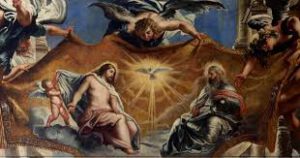
But still, God persevered. He did not reveal Himself directly to us all right, but by His infinite love He sent us His Only Son. Thus, God the Son, Jesus, born of Mary, lived and died as humans do, in everything but sin. Jesus revealed His divine origin to those who had eyes to see and ears to hear. He exhorted them to be like little children, simple and humble, to whom He reveals the mysteries of the Kingdom. 'Truly, I say to you, unless you turn and become like children, you will never enter the kingdom of heaven.' (Mt. 18:3).
God has so favoured us that we ought to gratefully honour his words. As St Paul says in the Second Reading (Rom 8: 14-17), ‘You have received the spirit of sonship, whereby we cry, Abba! Father!’ And needless to say, His Resurrection and Ascension became two undeniable proofs of His divinity.
To complete the picture, we got to know about the Holy Spirit at Pentecost. Today’s Gospel text (Mt 28: 16-20) reminds that, before Jesus ascended to Heaven, He commanded the apostles to go forth and baptise ‘in the name of the Father and of the Son and of the Holy Spirit.’ He instructed them not to leave Jerusalem until they had received the Holy Spirit which the Father would send them. Ten days later, the Holy Spirit indeed descended upon the Apostles and the Mother of Jesus gathered in the Cenacle.
What else does it take to believe in the Most Holy Trinity? It is incredible that despite being blessed with so many momentous happenings, let alone eloquent teachings, there are people who hold on to their prejudices. In fact, this Mystery mixed with a good dose of virtue should cause us to yearn for God. The gift of supernatural love can indeed quench that thirst, for God is love, and our Trinitarian God a divine family of love, a model for human households: members many, yet a close-knit family!
On this magnificent Solemnity of the Most Holy Trinity, let us first thank God very especially for the Revelation, for without it we would still be groping; let us next be grateful for the doctrine of the Church, her Fathers and Doctors; and finally, notwithstanding our limited human knowledge and reasoning, let us continually pray for ever-fresh insights into the undeniable reality of the Most Holy Trinity. It requires an essential degree of faith, purity and humility.
Also see: https://www.oscardenoronha.com/2023/06/04/the-holy-trinity-a-deep-mystery/
Outpouring of the Holy Spirit
You will be amazed to see the profusion of Readings on the occasion of Pentecost. It truly parallels the great outpouring of the Holy Spirit! While the Day Mass always has the same text for the First Reading, the Second Reading and the Gospel change cyclically. Besides, there are special Readings for the Vigil of Pentecost: four alternative First Readings, a Second Reading and Gospel that remain constant across the cycles. The Vigil indeed fills us with the joy of anticipation!
Pentecost very well deserves a trumpet blast, as it marks the glorious Birth of the Church. Just as a close-knit family gathers together in excitement even before the arrival of a baby, the Church imagines the community drawing together for the liturgy of the Vigil and virtually waiting on for a different liturgy at the Day Mass. Such is the emotion that goes with any birth, and all the more so with the mystery of our spiritual birth as a faith community.
Let’s begin with the Vigil Readings and note their aptness. Gen 11: 1-9 recounts humankind’s proud attempt to build a Tower that would reach God, and how God punished such insolence by confounding their speech. In contrast, at Pentecost those humble and faithful disciples were rewarded with the gift of tongues, the ability to communicate in languages unknown to them (xenoglossia or xenolalia).
The second alternative Reading (Ex 19: 3-8) refers to the moment when Moses had summoned his people to seal their covenant with the Lord. As he went up the mountain, his people down below witnessed thunder and lightning, a thick cloud and a very loud trumpet blast. This foreshadows the New Covenant given to the disciples gathered in the Upper Room. They too experienced fire and sound at the descent of the Holy Spirit.
The third possible Reading (Ezek 37: 1-14) recalls the valley of dry bones that was enlivened by God’s Spirit. It prefigures the life-giving effects of the Holy Spirit on the spiritual life and mission of His Church.
The last substitute Reading (Joel 2: 28-30) harks back to the time when God promised the Prophet that He would pour out his Spirit upon all flesh, letting people of all ages and ranks prophesy, dream of the future, see visions and wonders. This was fulfilled when the disciples gathered together with the Mother of God in the Cenacle.
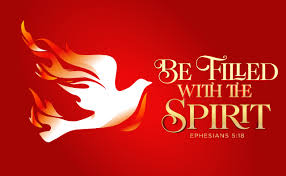
And talking of hope, St Paul in the Second Reading (Rom 8: 22-27) utters a paean to the Holy Spirit. He assures us that the Paraclete ‘intercedes for us with sighs too deep for words.’ In this valley of tears, where our life is so full of care and we have no time to stand and stare, when we and the whole of creation groan in travail, the Holy Spirit will renew the face of the earth. When this will happen we know not, but we must contribute to realise God’s Plan.
Finally, in the Gospel text for the Vigil Mass (Jn 7: 37-39), Jesus proclaims Himself as the Living Water. He announced this on the last and most solemn day of the Feast of the Tabernacles, an annual event that remembered the law and the covenant. It was one of the three feasts that the Jews observed, by sprinkling the altar with the waters of Siloam, in remembrance of that which had sprung out from the rocks of Mount Horeb. Post-Pentecost, the water of the Holy Spirit would flow continually.
As regards the Day’s Readings: in two blogposts we commented on that invariable First Reading (Acts 2: 1-11), ('Ecstatic and Fiery': https://rb.gy/y5a7f5 and 'Pentecost and Proclamation': https://rb.gy/4c0p3i ). Now we shall go straight to the Second Reading (Gal 5: 16-25) of Year B. Here, St Paul advises his community to live by the Spirit and refrain from gratifying the desires of the flesh. ‘The Spirit produces love, joy, peace, patience, kindness, goodness, faithfulness, humility and self-control.’ On receiving these gifts, so very different from what the world has to offer, we are invited to give up our old ways and live by that gift which has made us new.
Is this possible? The Evangelist (Jn 14: 15-16) quotes from Our Lord’s last discourse, at the Last Supper: ‘If you love me, you will obey My commandments.’ Yet, we are not alone in this divine enterprise; Jesus has promised us a Helper par excellence, the Holy Spirit, ‘who will stay with you for ever.’ The Holy Spirit, whom the Father has sent in His Son’s Name, will teach us everything and make us remember His commandments. All we have to do is believe and trust in Him.
For the Lord’s work to happen through us who are the Church, the Holy Spirit will instruct us opportunely. His outpourings will continue until the end of time.
The Real Ascension Story
Who would not believe a supernatural occurrence like the Ascension just because he has not witnessed even a pale resemblance of it? While today’s First Reading (Acts 1: 1-11) and Gospel (Mk 16: 15-20) describe the physical event, the Second Reading (Eph 1: 17-23) offers a theological interpretation. The bottomline is that in time those believing in the Lord of the Ascension will also enjoy the same experience.
We must bear in mind that everything about Jesus was supernatural – right from His joyful Birth to His luminous Transfiguration, sorrowful Passion and Death and glorious Resurrection. Unprecedented events they surely were, but always witnessed by many and duly recorded for posterity. In fact, in stitching together details from the evangelists and other writers, we note that differences in minor details make their narratives complementary, not contradictory. So, modern men and women ought not be sceptical but ever more trusting and believing.
Forty days in Galilee
The Ascension came about at the end of Jesus’ forty-day stay in Galilee following His Resurrection. In keeping with a prior promise, Jesus opted for that region (about 125 km away from Jerusalem) only to avoid a potential clash with the Sanhedrin. The Jewish supreme council was waiting to pounce on the newborn Church that was proclaiming their Risen Lord from the rooftops.
How did Jesus spend those forty days? He appeared several times to the Apostles, ‘in ways that proved beyond doubt that He was alive’. Once, at the iconic Lake Gennesaret, he surprised them with a miraculous haul. He was thus a provider of material goods to His inner circle whom the traitor Judas Iscariot had robbed of their kitty. But more importantly, Jesus was a provider of spiritual food. Taking the Eleven aside, He would decipher the hidden meanings of His public discourses.
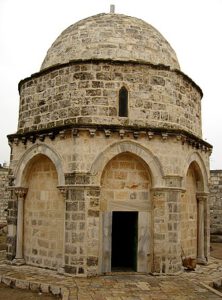
Jesus also took care to set up a second line of leaders. By asking Peter to feed His lambs (beginners in the faith) and sheep (those more mature in the faith), He virtually handed over His baton to the future Pope. Furthermore, to meet His disciples at once, he bade them gather at a mountain nearby. Was it here that Jesus once appeared to more than five hundred (probably from across Jerusalem, Judea and Galilee)? If so, this could well be regarded as the first Council of Christendom!
Were they upbeat about meeting Jesus? When He appeared in flesh and blood, the Apostles fell on their feet in worship, whereas some others doubted. Nonetheless, Jesus moved forward, commanding them to go and teach all nations, baptising in the name of the Father and of the Son and of the Holy Spirit. ‘Teach them to keep all things that I have commanded you, and lo! I am with you all days, even to the consummation of the ages!’ he assured them.
When the day of his departure was close, he met with the Apostles in Jerusalem. They were probably preparing for the Shavuot[1]. There, at His last meal together, He instructed them not to leave the city of David until they had received the Holy Spirit. He showed how the references to Him in the Scriptures – in the law of Moses, in the prophets and in the Psalms – were unfolding.
Then, Jesus rose up and led them to the Mount of Olives. The Apostles followed enthusiastically, believing that He was going to restore the political dominion of Israel. Alas, the more Jesus spoke to them of Heaven, the more they dreamt of life on earth! Our Lord retorted: ‘It is not for you to know the times and seasons which the Father has fixed by His authority. Enough for you to know that the Holy Spirit will come upon you, and you will receive strength from Him; you are to be My witnesses in Jerusalem and throughout Judea, in Samaria, yes, and to the end of the world.’
How ashamed the Apostles must have been for broaching inanities! They walked on in silence, until they came to the top of the hill. There, Jesus lifted up His hands to bless the Apostles. And while He did so, He was seen rising body and soul above the hilltops and fading into the firmament. Tradition has consecrated this site as the Mount of Ascension and Christian piety has memorialised the event by erecting a basilica over the site. An octagonal structure thereabouts, now used as an oratory, encloses the stone said to bear the imprint of the feet of Christ.[2]
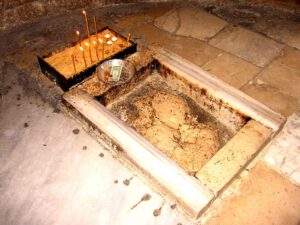
Our Ascension
Needless to say, the Apostles were awestruck. Two angels in shiny white garments addressed them: ‘Galileans, why are you standing here looking up at the sky? He who has been taken from you into heaven will come back in the same way that you saw Him go to Heaven.’ So, they went back full of joy to Jerusalem, praying, praising and blessing God.
What about us? What does the Ascension mean to us today? In one of his Ascension homilies, Pope John Paul II said: ‘In the Scripture readings, the whole significance of Christ’s Ascension is summarised for us. The richness of this mystery is spelled out in two statements: Jesus gave instructions, and then Jesus took his place.’[3]
Jesus had instructed the Apostles to speak explicitly about the Kingdom of God and about salvation. The early Church clearly understood the instructions and the missionary era began and will not end until the same Jesus, who went up to heaven, returns. His words are a treasure for the Church to guard and to proclaim. In the words of thenow canonised Pontiff, ‘Our greatest challenge is to be faithful to the instructions of the Lord Jesus.'
About Jesus taking His place at God’s right hand, the Pope quotes his predecessor Leo the Great, who once remarked that ‘the glory of the Head became the hope of the body.’ That is to say, from His throne of glory, Jesus sends out to the Church a message of hope and a call to holiness. ‘The Church may indeed experience difficulties, the Gospel may suffer setbacks, but because Jesus is at the right-hand of the Father the Church will never know defeat. Christ’s victory is ours.’
Jesus is no longer physically present on earth but He is eternally alive and in our midst through the Holy Spirit. Thanks to Him, Heaven and Earth have drawn closer, such that ‘the efficacy of Christ’s Ascension touches all of us in the concrete reality of our daily lives.’ Our Ascended Lord participates in our toils and sufferings. He who entered the world through the Incarnation and returned to the Father through His Ascension wishes to save us for eternity. His Ascension is a prelude to the ascension of believing humankind. That’s the ultimate Ascension Story.
[1] The single most important event in Israel’s history, commemorating the handing of the Torah, or Pentateuch, to Moses at Mount Sinai.
Love and Salvation
Achieving peace of mind and heart is probably the one goal common to all of humankind. We live for it, and we even die for it. Happiness is all we seek, except that we sometimes use the wrong ‘search engines.’ And that makes all the difference. Ends do not justify the means; and at other times, not even knowing what our ends should really be is confusion worse confounded.
It is sad when we make of our life on earth an end in itself. We live as though our days will stretch out for ever and are blank on our eternal salvation. That is when Biblical posers like ‘What does it profit a man if he gains the whole world and loses his soul?’ (Mk 8: 36) makes us jump out of our skin. This has happened to so many who have gone before us – perhaps, most famously, to St Francis Xavier, whose date of arrival in Goa we commemorate tomorrow.
However, if we care to have the mind of Christ, we will not only appreciate the divine plan but also have our own perspective plan in line with it. His plans are based on love – because ‘God is love’, as St John puts it very plainly in the Second Reading (1 Jn 4: 7-10). Love is the very essence of God, and ‘he who loves is born of God and knows God, and he who does not love, does not know God,’ says the Beloved Disciple.
Further down in the text (not part of today’s Reading), the Epistler says, ‘No one has ever seen God, but if we love one another, God lives in union with us, and His love is made perfect in us.’ (1 Jn 4: 12) No doubt, some, like Moses, have seen God face to face, but as to the rest of us, since our physical eyes can perceive only the physical, even if in a limited way, we need to make a spiritual effort to see God, a spiritual and invisible being, with our mind’s eye.
We will never fully understand God, let alone see Him. And love: do we know how that works? Love is an overused, nay, abused word, whose true meaning is outlined by the Catechism of the Catholic Church (§§ 733, 1766, 1829, 2658). Love has been examined times without number by philosophers and poets, saints and sinners, yet few have done it justice. Meanwhile, the celebrated Catholic writer C. S. Lewis speaks of Affection, Friendship, Eros and Charity, in his book The Four Loves. He bases himself on the Greeks who distinguished between storge, philia, eros and agape, and demonstrates how very often they quite imperceptibly merge into each other.

Accordingly, affection or storge is familial love, or the ties we have with whoever and whatever we consider our very own. Friendship or philia covers those who we are naturally attracted to by the values we share. This is different from Eros, a passion primarily understood as sexual, but which could also be of an aesthetic or broadly (not necessarily holy) spiritual nature. Lewis discerns the deceptions and distortions that could well render these three natural loves dangerous if devoid of the sweetening grace of Charity or Agape, the divine love that must be the sum and goal of all.
Where do we find the supreme example of divine love? ‘God so loved the world that He gave His only Son, so that everyone who believes in Him might not perish but might have eternal life’ (Jn 3: 16). The Letter to the Hebrews puts it vividly: ‘In the past God spoke to our ancestors through the prophets at many times and in various ways, but in these last days he has spoken to us by His Son, whom He appointed heir of all things, and through whom also He made the universe’ (Heb. 1: 1-2). In effect, while Jesus has redeemed us of our sins, by His supreme example of love, He has also made God visible and accessible to us.
For His part, Jesus said: ‘Greater love has no man than this, that a man lay down his life for his friends.’ None that have claimed to be God ever did so, except Jesus, who died for our sake. That catchy line from today’s Gospel (Jn 15: 9-17) is followed up by a command: to love one another as He has done and to bear abiding fruit. What better way to set that love in motion than going out into the world and proclaiming the Gospel? As we see from the First Reading (Acts 10: 25-26, 34-35, 44-48), ‘God shows no partiality, but in every nation any one who fears Him and does what is right is acceptable to Him.... The gift of the Holy Spirit has been poured out even on the Gentiles.’
You and I are called to be instruments of God’s love, by giving witness to all, including the non-Christian world, as Peter did at the house of Cornelius the Centurion. We must not do anything in fear or for personal gains, but simply persevere in love; we need not worry about how we are to speak or what we are to say, for that will be given to us at the right time. Our love, sincere and self-sacrificing, must reflect God’s love. This will serve as evidence that God truly exists and that His Son is the Lord of our eternal salvation.
Abiding with God
Today’s Readings make it clear that all is well when God is with us. But what about us: are we always with Him and for Him? Being on God's side may seem a natural thing, but we do reject Him sometimes, don’t we? Sin is to blame. It causes us to disbelieve. Hence, a turnaround is always in order and can make all the difference.
That is how it was in the life of Saul. In the First Reading (Acts 9: 26-31), we see how his life changed on his way to Damascus, in a personal encounter with the Risen Lord. Given his poor track record, however, the Apostles did not regard him as a disciple. Until Barnabas put in a word for him. He told them how Paul had boldly preached Jesus in the capital of Syria. In an about-face, Saul had become Paul.
‘Great things happen when God mixes with us,’ says a hymn. ‘Some find life, some find peace; some people also find joy…. Some see their lives as they never could before/ And some people find that they must now begin to change.’ That was the story of Paul too: he found life, peace, joy. Above all, he found the need to change. Enriched by special charisms, he argued among the Hellenists (Greek-speaking Jews), and eventually became one of the greatest spokesmen for Christ.
Meanwhile, St John in the Second Reading (1 Jn 3: 18-24) stipulates that love of God ought not to be limited to word or speech; it must be seen in deed and in truth. It is vital for love of God to translate into love of neighbour. Not a cakewalk, though. Very often, we only act civil and camouflage our bitterness. Worse still, if we do it for self-gain. Plain-speaking or forthrightness is preferable; it may make us vulnerable, but then, we have nothing to hide – or lose – anyway, do we?
It goes without saying that love must not be self-centred but God-centred. But to think that we can love by ourselves is an illusion; we can do so only with God's help. Human beings are selfish by nature, and trying to love neighbour before we learn to love God is like chasing an impossible dream. The fact is that mutual love would come more easily if everyone made an effort to put God before self. We cannot stress enough how God has to be at the centre of our attention.
To make God the be-all and end-all of our life, it would be ideal for members of our community to share the same understanding of Him. This is possible if we all seek the truth and are duly instructed. Proper catechesis would go a long way towards making up for heterodox ideas gaining currency in our midst. The world would find it easier to accept Jesus as our only Saviour, if Christians readily bore witness to Him. After all, Jesus has proved His Divinity. His Resurrection is the bedrock of our faith. Against this fact there can be no argument nor authorities or testimonies devoid of counterproof.
Earlier in the Easter season Jesus said: ‘I am the Bread of Life’ (Jn 6: 35); ‘I am the Light of the World’ (Jn 8: 12); ‘I am the Door’ (Jn 10: 9); ‘I am the Good Shepherd’ (Jn 10: 11, 14); ‘I am the Resurrection and the Life’ (Jn 11: 25); ‘I am the Way and the Truth and the Life’ (Jn 14: 6) – and in today’s Gospel (Jn 15: 1-8), He says: ‘I am the Vine’ (Jn 15: 5). He is the Vine; His Father, the Vinedresser; and you and I, the branches of the Vine. Every branch that bears fruit is pruned by the Heavenly Father that it may bear more fruit; every other that doesn’t, he takes away.
Thereafter comes a clincher: ‘He who abides in me and I in him, he it is that bears much fruit, for apart from Me you can do nothing.’ To abide in Him we have to be clean, be pruned of all our imperfections; to abide with Him means to keep His commandments. It is one thing to be patient towards those who have not had exposure to Christian doctrine; it is quite another to be complaisant towards those of our flock who consciously offend God, be it in words or deeds. Many mock Him openly, others adopt irreverent postures. This calls for some fraternal correction, or else, of love there will only be the shell.
St Paul calls us to be all things to all people. Yet, we must never act against moral principles merely to love others or be loved by them. It is futile to love others out of human respect (excessive regard for their opinions or esteem). No person is worth sacrificing a principle for; and it is ‘better to take refuge in the Lord than to trust in princes.’ Even a morally good act is meritorious only if done because it follows God’s law and is intrinsically good. In fact, only when human law is united with divine law, and human love with divine love, can divine life penetrate human life. That is when we will truly abide with God and He in us.
Ever faithful, never mute
Post-Easter Readings have a special freshness and power conveyed by the Holy Spirit. No matter what their perception of Christ earlier, the apostles now are fully convinced that He is the True God. Maybe they had looked at Him merely as a provider of material goods, be it bread or physical cures; they had failed to see Him as the spiritual provider – the Way, the Truth and the Life. By now they – and we too – know better.
The First Reading (Acts 4: 8-12) builds on what we read last Sunday. Peter, in treating a lame man, attributed the cure to the power of Jesus. Peter and John were still speaking in the Temple when some priests, the officer in charge of the temple guards, and some Sadducees got them arrested and jailed. When questioned by the Sanhedrin, Peter charged his countrymen with killing Jesus, whom God then raised from death. That the dead will one day rise to life was anathema to the Sadducees.
Peter went on to relate the present happenings to the Scriptures: ‘The stone that you the builders despised turned out to be the most important of all,’ said Psalm 117. He reiterated that salvation is to be found through Jesus alone; in all the world there is no one else who can save us. This was surely more than the self-righteous authorities could bear to hear. Understandably, those words also refer to God’s infinite love and to how ‘it is better to take refuge in the Lord than to trust in men.’
This is clearly a reminder that we have to repurpose our life in the light of what Peter has said. In the Second Reading (1 Jn 3: 1-2), his co-apostle John calls upon us to consider ‘what love the Father has given us’. Had He not loved us with a fatherly love, would He have sent us His Son Jesus? By the Incarnation and the Supreme Sacrifice on Calvary He showed us that He loved as His very own. Hence, we ought to be faithful. The fruits of our faithfulness may not be visible today, but ‘when He appears we shall be like Him, for we shall see Him as He is.’
The practical implication is that in every circumstance of our life we must turn our eyes heavenward for an answer. God works in and through us. Whereas the spirit of the world will always be antithetical to the spirit of God, it is of the essence that we keep the faith. When the Son of God returns, everything will become clear as day. The veil covering our immediate reality will be removed and we shall appreciate our glory as children of God. The once frolicking children of the world will then appear as children of darkness.
In fact, for those who have eyes to see and ears to hear, this is not rocket science. In a world teeming with life coaches and leaders of all kinds, all of them promising the moon but failing to deliver, today’s Gospel text (Jn 10: 11-18) calls to mind a most tender image of a caring God who promises absolute love and care and delivers it. To put it in context, Jesus had just cured a man blind from birth. When the temple authorities found him acknowledging the Son of Man, they summarily expelled him from the synagogue. It prompted Jesus to deplore the sin of spiritual blindness – the refusal to acknowledge God. And to give the man solace, Jesus presented Himself as the Good Shepherd. The Fourth Sunday of Easter is therefore called 'Good Shepherd Sunday'.
By this, Jesus evoked a scene that every Jew was familiar with: the self-sacrificing nature of a shepherd worth his salt. A good shepherd defends his flock against enemies, keeps watch over them and shuts himself up with them at nightfall. At dawn, he counts their number and leads them safely to fresh pastures. While he is with them, he now and again utters a shrill call; recognising his voice, the scattered sheep huddle around him. For sure, a stranger’s voice enticing them will not receive the same response, for the flock recognise him not.
Such is the case of every authentic shepherd and his flock. In a broad sense, the shepherd could be a parent, teacher, elder, counsellor; the sheep would be the children, students, youngsters, and those in need of counsel. Above all, it is the image of the church. The Pope is recognisably Jesus’ supreme representative on earth; he is the shepherd, we the flock. As much as the Pope is obliged to be a good shepherd, we are called to be good sheep. Jesus was also concerned about ‘other sheep that are not of this fold'; in His words, 'I must bring them also, and they will heed my voice, so there shall be one flock, one shepherd.’ The Pope has to do likewise. Together, we can build the Church, which is the Mystical Body of Christ. This is a mission in which the sheep must help their shepherd.
On the other hand, he who is only a hireling and not a shepherd will leave the sheep to the wolves and flee, for he cares not for the sheep. What, then, are we to do as sheep? We must be wary of false shepherds. And if by some misfortune the shepherd becomes a wolf, we the flock must defend ourselves.[1] As a community, we must shed our inhibitions, our goody-goody image. Aren’t we taught elsewhere in the Bible to ‘be shrewd as a serpent, yet innocent as a dove’ (Mt 10: 16)? So, both shepherd and sheep must stand up, speak up. We are called to be ever faithful, never mute.

